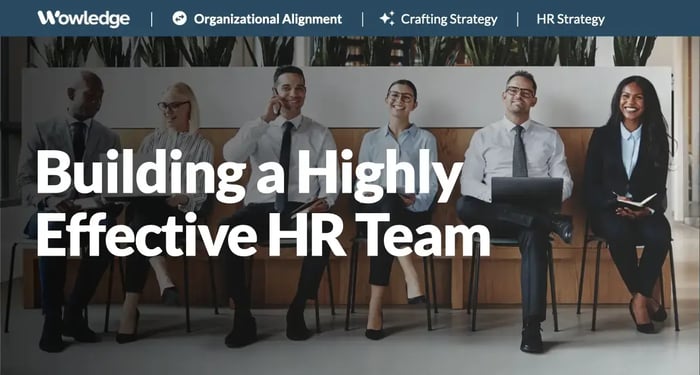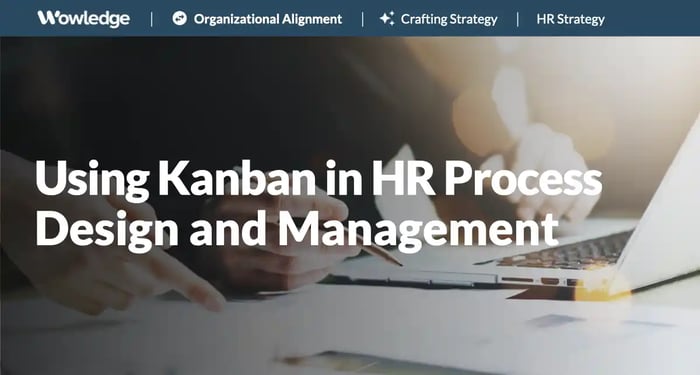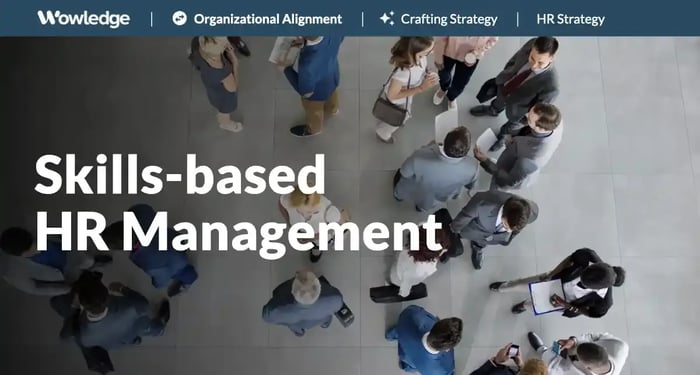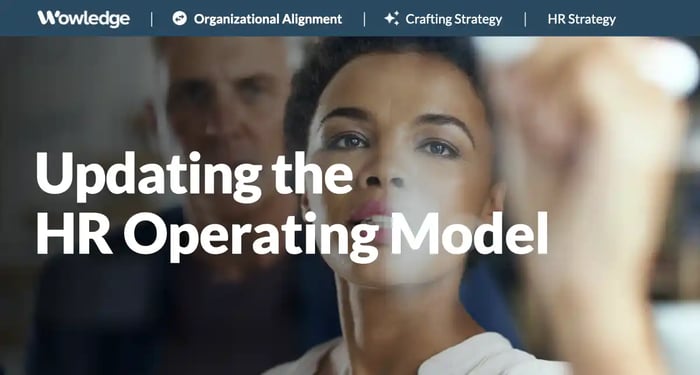Table of Contents
- The core capabilities of an impactful HR team
- How to build and sustain a highly effective HR team
- What skills and capabilities are necessary for a highly effective HR team?
- Eight key roles needed for an effective HR team
- 1. CHRO or HR Leader/Director/Manager
- 2. HR Business Partner (HRBP)
- 3. Talent Acquisition Manager/Recruitment Specialist
- 4. Learning and Talent Development Manager/Specialist
- 5. Compensation and/or Benefits Specialist
- 6. HR Generalist
- 7. HR Coordinator
- 8. HRIS (Human Resources Information System) Specialist
- Relevant Practices & Tools
- FAQs
In a business world where change seems to be a constant, with pressures created by the global interconnectedness of markets, socio-political dynamics, dramatic workforce shortages, generational population shifts, and technological advances impacting work processes, the critical role of Human Resources (HR) can scarcely be overstated. Serving as a core element of organization-building, how to build an HR team that not only orchestrates the recruitment, management, development, and engagement of a diverse workforce but also serves as the steward for fostering a positive organizational culture is a challenge. The combination of diverse skills and abilities within an HR team not only supports the seamless functioning of day-to-day operations but also equips the organization to strategically address challenges, adapt to changes, and catalyze growth. In the interplay between human capital and business success, the art of crafting an HR team emerges as a basic requirement for sustainable success and competitive advantage. The need to build an HR team with all the necessary skills and capabilities is core to that proposition.
The core capabilities of an impactful HR team
A key starting point is to identify the opportunities that HR has to drive the achievement of corporate objectives. Identifying those key drivers is essential, and from numerous surveys and studies over the years, five priority activities used to build an HR team tend to emerge as providing the greatest contributions:
Driving the business
Creation of approaches that address the people-related drivers and barriers to the achievement of specific business directions, strategies, initiatives, and challenges. Crucial to this is understanding the core value proposition that the organization provides to its customers, how it creates financial value for its investors, how it approaches different markets, and how it manages partnerships and supply chains for optimal results.
Championing the culture
Development of an environment that supports constructive employee performance, retention, engagement, and commitment to the mission of the organization. After defining the company’s purpose, mission, and values, and identifying the base elements of a culture that will support those, it is necessary to practice integrated talent management to support and reinforce those. It also engages HR in developing strategies and interventions that maximize individual, team, functional, and organizational performance.
Developing leaders
Taking steps to ensure the quality of leadership and the aggregated capability to envision and plan for the future, understand the external and internal drivers and barriers to success, engage and motivate employees, and manage work processes. The creation of a leadership culture that is self-sustaining requires attention to quality identification/selection/promotion practices, robust development programming, succession management processes, and ongoing leadership coaching and mentoring.
Acquiring and developing skills
Building a workforce that simultaneously and continuously meets operational, cultural, and skill requirements, growing and evolving with the organization’s strategic direction(s). This requires a talent acquisition strategy that can produce a sufficient volume of qualified candidates in a timely manner and a learning and development capability that keeps those employees’ skills updated and readily available as new corporate products, services, and operating capabilities are expanded and developed.
Practicing data-based decision support
Establishing standards for decision-making based upon objective insights generated from a quality measurement and evaluation ecosystem. This requires an awareness and capability for generating and analyzing HR data leveraging information systems and analysis methods. Measurement should include (past) historical or trend analysis, (current) ongoing employee sensing/listening, and (future) predictive tools, all of which integrate HR and business data. The goal is to generate useful insights into the impact of human behaviors, skills, and capabilities on a variety of business outcomes (e.g., sales, profitability, operational efficiency, customer satisfaction, product/service innovation, and so on).

How to build and sustain a highly effective HR team
Establishing a highly effective HR team involves a combination of strategic planning, hiring the right talent, fostering a positive work culture, and implementing efficient processes. There are critical steps to follow in order to build an HR team that drives business success.
1. Define the HR strategy
Determine the direction that the HR function needs to take, a dynamic and continuous process. Assess the business needs and strategies and where HR’s expertise, processes, programs, resources, and practices can be leveraged for high impact. Focus on the key areas where HR can add value, with an eye on the desired talent outcomes such as critical role recruitment, employee skill certifications, employee engagement, high performer/potential retention, etc. Set HR staffing and development priorities based on the identified needs.
2. Clearly define roles and responsibilities
Clarify staffing needs based on the intersection of needs and available budget. Assess the ability of the team to deliver the required balance of administrative work (e.g., policy guidance, process management, benefits administration, and so on) with strategic efforts (e.g., workforce planning, managerial coaching), and programmatic work (e.g., recruitment, learning and development, succession planning). Such an assessment should lead to a conclusion regarding the extent to which generalists vs. specialists are deployed. Build an HR team by creating well-defined job architecture, descriptions, and expectations for each role.
3. Hire and deploy the right people
Recruit HR professionals who have a strong understanding of the industry, business objectives, and HR best practices in the areas that are prioritized for the successful execution of the HR strategy. Look for candidates who possess the right mix of excellent communication, problem-solving, critical thinking, project management, and quantitative and interpersonal skills. Keep in mind the aggregated skills that the team needs, filling gaps as each additional or replacement individual is brought on board. As requirements are updated or changed, assign roles based on individual strengths and expertise, with an eye on developing capabilities with training, cross-functional work, or project assignments.
4. Promote continuous learning
Encourage HR team members to stay updated on the latest HR trends, laws, and best practices by providing access to professional and industry associations, journals, conferences, and experts/consultants. Require attendees to report back a summary of their learnings and possible applications to the organization’s challenges in formal presentations to the rest of the team. Provide opportunities for professional development through targeted training, workshops, and certifications that map to employees’ career arc and development plan, as well as experiential development opportunities, such as cross-functional projects or informal learning. Encourage team members to take non-HR courses and certifications, such as MBA programs, financial or accounting coursework, marketing and sales seminars to further their understanding of the objectives, drivers, and goals of the work being conducted within the business.
5. Develop efficient HR processes and technologies
Create a work ecosystem that enables team members to focus their efforts on strategically impactful activities, such that those are optimally efficient and effective. Setting them up for success means focusing on streamlining recurring HR processes such as recruitment, onboarding, performance evaluations, and benefits administration to reduce administrative burdens and improve efficiency. Invest in HR technologies and tools that can serve to automate repetitive tasks, provide self-service opportunities for employees and managers, enhance accuracy, and provide highly responsive and easy-to-access/use HR services.
6. Emphasize data-driven decision-making
Increase HR responsiveness, accuracy, and agility by informing decision-making through data and analytics. Embedding metrics in both HR and managerial tool sets allows for more rapid trend assessments, accurate issue analysis, and objectively based decision support. Build an HR team that monitors key HR metrics such as turnover rate, time-to-fill vacancies, quality of hire, training effectiveness, and the operational impact of a wide range of HR programs and processes to identify areas for improvement. Leverage predictive analytics to better (and more objectively) create leading indicators of key outcomes such as retention, new hire success, potential, sources of quality hires, engagement, and productivity.
7. Encourage innovation
Create an environment where the HR team feels empowered to suggest and implement innovative HR solutions. Support experimentation and risk-taking to drive positive change. Create opportunities for HR employees to work on cross-functional process improvement, program development, or other project teams designed to create new ways of conducting the business of hiring, managing, developing, and retaining people. Build an HR team with the skills and drive to create new processes, practices, and programs. Actively engage team members in designing solutions to not only HR issues but broader business issues wherever possible.
8. Measure and improve
Develop a broad assessment and evaluation strategy for the HR function that measures the performance of the HR team against established goals and KPIs. Collect feedback from employees, managers, and other stakeholders to identify areas for improvement and implement necessary changes. Create an expectation that the data will be used not only by team members in the development and refinement of existing processes and programs but also that the results will be used in their performance assessments. Leverage such an approach to train and develop team members in its expansion to the use of measurement to inform joint HR and managerial decision-making in assigned functions and internal customer organizations.
Remember that to build an effective HR team requires an ongoing process. It requires consistent effort, collaboration, and a commitment to creating a positive and productive work environment. And always remember to lead and manage the team with the same standards and practices that are being promoted by HR in terms of employee well-being, performance management, organizational agility, inclusivity and belonging, flexibility, and an overall healthy workplace environment.

What skills and capabilities are necessary for a highly effective HR team?
A highly effective HR organization requires a diverse set of skills to successfully manage various aspects of human resources, support managers and employees, and contribute to the organization's overall success. To build an HR team that drives business improvement, efficiency, and results, it is necessary to include the skills and abilities, commonly referred to as competencies as well, that are essential for employee selection, development, and promotion decisions. Here are some key skills that are necessary for members of an effective HR team:
- Problem-solving and Critical Thinking. HR team members should be adept at identifying issues, analyzing complex situations, and coming up with practical solutions that align with the organization's goals. A key aspect of this is understanding how to leverage the range of available methodologies and HR resources for integrated solution development in service of resolving business and talent challenges.
- Emotional Intelligence and Interpersonal Skills. Understanding and managing emotions, both those of self and others, helps HR professionals navigate sensitive situations and create a positive work environment. Exploit that for the benefit of others, especially in applications such as leadership and managerial coaching, conflict resolution, change management, and employee listening.
- Organizational Skills. Effective HR teams need to manage a wide range of tasks, from recruiting to employee development to compliance. Strong organizational skills are essential for handling these responsibilities efficiently. From the HR business partner balancing strategic input with change management oversight to the HR COE specialist navigating a balance between research and design with process management, it is a constant challenge.
- Adaptability and Flexibility. The HR landscape can change rapidly due to shifts in corporate direction, and industry trends, technology, and regulations. HR professionals need to be adaptable and open to learning new skills and adjusting plans “on the fly”. Building the capability for shifting priorities starts with hiring people with the right experience and capabilities and adapting their goals to changes encountered throughout the year.
- Data Analysis and Decision-making. Using data to inform decisions helps HR teams identify patterns, make strategic choices, and measure the impact of their initiatives. Providing access to systems, tools, and methodologies and developing expectations and standards around the use of data in decision-making are essential to support the continual development of such skills.
- Change Management. Effectively navigating and facilitating organizational change is a necessary capability as it covers a range of external challenges and internal transformations. These changes could be related to shifts in macroeconomics, markets, processes, technologies, structures, strategies, or even company culture. Change can be unsettling for employees and can lead to resistance, reduced productivity, and increased stress if not managed properly.
- Collaboration Skills. The motivation and ability to work with others from different functions, perspectives, skillsets, and styles are foundational to quality teamwork. Given the roles of HR as a business partner, change agent, coach, and culture champion, collaborative capabilities are essential. The use of such skills is a critical success driver in the joint design and development of successful solutions to business and talent challenges with business leaders and teams.
- Communication Skills. Clear and effective communication is crucial for conveying policies, procedures, decisions, direction, and important information to employees, managers, and other stakeholders. The ability to explain a wide variety of outputs from HR (and leadership) activities to employees in a range of roles, educational/cultural/socioeconomic backgrounds, and locations is an essential skill for members across the HR community.
- Negotiation and Conflict Resolution. HR professionals often need to mediate disputes, negotiate terms, and find solutions that satisfy both parties involved. Particularly in a business world where the use of a broader ecosystem of workforce sources (full-time, part-time, contractor, consultant, “gig workers”, outsourcing companies, etc.) is becoming more commonplace, the ability to manage those relationships is critical. This also taps into the role of the HR professional as a member of business leadership teams, where such skills are elemental.
- Ethical and Legal Awareness. A deep understanding of employment laws, regulations, and ethical considerations (across global regions and national borders) is crucial to ensure the organization remains compliant and treats employees fairly. Particularly in the current environment with increased global operations and where Environmental, Social, and Corporate Governance (ESG) considerations have become a major Board of Directors concern, these loom large as areas of awareness and expertise on the HR team.
- Technological Proficiency. Familiarity with HR software, tools, data sources, and systems helps streamline processes like payroll, benefits administration, shared services, and talent management. This is particularly important in the generation and use of HR analytics. Awareness and experimentation with emerging technologies (e.g., artificial intelligence, augmented and virtual reality, bots) are also becoming highly relevant to HR teams, especially those involved in policy development, learning and development, talent acquisition, and shared services.
- Cultural Sensitivity and Diversity Awareness. HR teams should be sensitive to cultural differences and promote an inclusive work environment that values diversity. As the global working population becomes increasingly varied in terms of backgrounds, cultures, nationalities of origin, etc., understanding how to attract, manage, and build those into seamlessly integrated work teams and organizations has become essential to the HR toolbox.
- Employee Experience and Customer Service Orientation. Viewing employees as internal customers and providing excellent support contributes to a positive employee experience. Core to this is the understanding and appreciation of employees and managers as process and program design partners, where their opinions and preferences heavily influence how those are built and evolve.
- Project Management. HR initiatives often involve various stages and stakeholders. Project management skills help HR professionals plan, execute, and evaluate these initiatives effectively. As designers of a wide range of processes, systems, policies, and programs, project planning and management continue to be essential tools for HR teams. Focused on the skills to define and manage key project elements, steps, timelines, deliverables, and accountabilities, these plans provide assurances that the project can be brought to full fruition on an agreed-upon timeframe.
Eight key roles needed for an effective HR team
When designing an effective team, there are key roles to consider including that can most effectively design and deliver the range of services that a mid-to-large sized organization needs. The combination of roles depends upon the business and talent needs of the company, but generally follow along similar lines across industries.
To build an HR team, include some key roles along with the key capabilities that each role requires:
1. CHRO or HR Leader/Director/Manager
The strategic architect of the organization's Human Resources function. The CHRO is primarily responsible for overseeing HR policies, programs, and compliance, as well as aligning HR strategies with business goals, and leading the HR team to deliver the HR services and solutions that drive the organization's success.
Capabilities: Leadership, collaboration, business acumen, strategic thinking, decision-making, project management, and team management.
2. HR Business Partner (HRBP)
The liaison between HR and business operations. The HR Business Partner collaborates closely with different departments, understanding their needs, and providing customized HR solutions. Often act as consultants, offering guidance on talent management, organizational development, performance improvement, and change management, among other programs and services.
Capabilities: Strategic thinking, problem-solving, consulting skills, business expertise, collaboration, analytics prowess, talent management and organization development expertise.
3. Talent Acquisition Manager/Recruitment Specialist
In charge of securing the best possible talent for the organization. The talent acquisition specialist oversees recruitment from drafting job descriptions to sourcing candidates, conducting interviews, and negotiating offers. Their goal is to build a skilled, diverse workforce that aligns with the organization's requirements.
Capabilities: Recruitment expertise, labor market/industry/competitor markets, relationship-building, assessment skills, communication, and data analysis.
4. Learning and Talent Development Manager/Specialist
Nurturing employee growth is their mission. The Learning and Talent Development Specialist designs and implements training programs, workshops, and development initiatives, both formal and informal, that enhance employees' skills, career paths, and overall performance, contributing to the organization's long-term success.
Capabilities: Training design, facilitation, needs analysis, employee development, career development, and organizational development.
5. Compensation and/or Benefits Specialist
Responsible for designing and managing the organization's rewards and recognition programs. The compensation and benefits specialist analyzes market data, establishes competitive salary structures, administers benefits packages, and ensures that compensation practices align with company objectives while attracting and retaining top talent.
Capabilities: Compensation analysis, benefits administration, data management, project management, market awareness/assessment, and attention to detail.
6. HR Generalist
A versatile role encompassing various HR functions. The HR Generalist's primary responsibilities involve handling HR operations, employee relations, performance management, compliance, and other day-to-day HR activities. They serve as a point of contact for employees, providing guidance and support on a wide range of HR matters.
Capabilities: Conflict resolution, communication, empathy, negotiation, knowledge of HR processes/policies/practices, legal knowledge, research skills, and regulatory compliance.
7. HR Coordinator
Plays a vital role in supporting HR operations. The HR coordinator manages administrative tasks, assists with onboarding new hires, maintains employee records, and facilitates communication between different departments and the HR team. They ensure HR processes run smoothly.
Capabilities: Multitasking, administrative skills, attention to detail, knowledge of HR processes/policies/practices, communication, and empathy.
8. HRIS (Human Resources Information System) Specialist
Manages and optimizes HR technology systems. The HRIS specialist oversees the implementation and maintenance of HRIS platforms, ensuring accurate data management, generating insightful reports, and streamlining processes to enhance efficiency across HR operations.
Capabilities: Data management, technical proficiency, system administration, analytics, reporting, and communications.
The capabilities and responsibilities of any given HR role will vary based on the organization's specific needs, (business) organization structure, and industry, along with the HR team's size, budget, and delivery expectations. Those roles need to align with an organization's goals and the skills of the available HR team members. Leading practice calls for the roles and responsibilities to evolve over time to expand individual skills and develop broader HR organizational capabilities. Build an HR team that encompasses these roles and the aggregated skills for an effective HR function.
Relevant Practices & Tools
Advanced HR Strategy Practices to Plan for Delivery of Impactful HR Services and Support. >
Advanced HR Strategy is a refined approach to planning long-term HR priorities. It involves increased specificity of plans and goals around key employee groupings... more »
Structuring the HR Organization to Best Meet Business Needs. >
The design of an HR organizational model requires considering a number of potential factors - the available HR budget, business organizational structure, business and... more »
Evaluating and Selecting an HR service Delivery Model that Optimizes Short and Longer-term Impact. >
Before determining how to structure an HR team, a set of considerations should be reviewed regarding the "operating or service delivery model" to be implemented... more »
Assessing the Change Impact on Specified Stakeholder Groups for Prioritizing Activities. >
Understanding how an initiative will impact the organization and specific stakeholder groups or people is key to designing effective change management strategies... more »
The Goals & Trends Conversion Tool: Translate Barriers and Enablers into HR Challenges for the Development of Strategic Objectives. >
This tool is used in a succession of analyses to take identified external and internal business trends and strategic goals and convert them into HR objectives closely aligned... more »
FAQs
In what sequence should an HR leader build capabilities when resources are limited?
Start with a “minimum viable HR” that stabilizes core risk and the employee experience through legally compliant hiring, comprehensive onboarding (e.g., enculturation, day-one access to equipment, workspace, and systems), accurate payroll and benefits, and a reliable HRIS for the worker file. Next, add a strategic HRBP capability to gather business requirements and convert them into a quarterly HR roadmap. Layer in recruiting capacity for critical roles and a basic analytics package (headcount, turnover, time-to-fill, engagement pulse). Only then expand to learning, rewards design, and succession, anchoring each addition to a visible business outcome.
How can HR demonstrate ROI and secure needed investments?
Translate initiatives into how they can impact one of four primary business levers: driving revenue (faster ramp for sales hires), controlling costs (reduced turnover/backfill), managing risk (audit findings avoided), and optimizing capacity (administrative time reclaimed). Establish baselines, run time-bound pilots, and calculate before/after comparisons with a matched comparison group where feasible. Present a simple payback and 12-month contribution margin for each initiative alongside qualitative benefits like culture or brand. Publish a quarterly “value realized” brief to keep finance and business leaders engaged.
How can HR build career paths and retain its own talent?
Create a capability map and career architecture with dual tracks (expert and leadership), clear proficiency levels, and example rotations across COEs, HRBP, and shared services. Use 6-12 month special assignments, such as roles in a project PMO, site startup, organization restructuring, or process reengineering to accelerate professional growth and reduce single points of failure. Offer training paths and formal credentialing in analytics, employment law, rewards, OD, and coaching, tied to pay bands, with associated internal marketplaces for “side project application experiences. Track internal mobility, time-to-promotion, and skill attainment as team health metrics.
What operating rhythm keeps HR tightly aligned with business outcomes?
Adopt a quarterly business review cadence with HR and business leaders jointly attending: talent reviews and insights in month one, planning and resourcing in month two, and delivery check-in in month three. Anchor goals in a concise HR scorecard, measuring three business outcomes, three talent outcomes, and three operational KPIs, each with assigned owners and goals/targets. Pair dashboards with narrative “so what/now what” briefs so leaders are impelled to act, not just review without action. Hold retrospective reviews each quarter to capture wins, misses, and decisions, feeding the next roadmap and budget requests.









